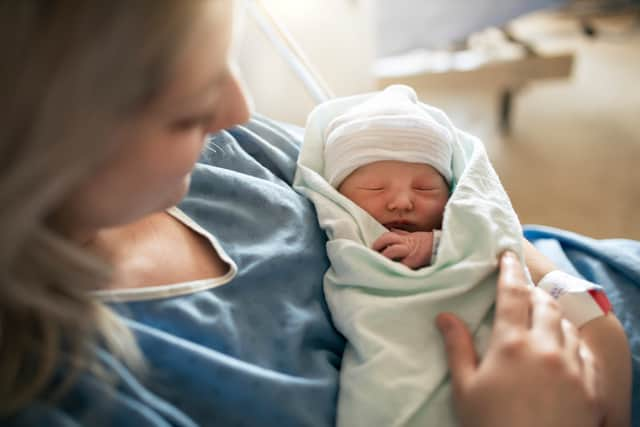Babies born in UK hits 20-year low - but government adviser says it is ‘good for our planet’ and ‘overconsumption’
and live on Freeview channel 276
The number of babies born in the UK has hit its lowest ever level since 2002 - but a former government adviser said this is “good for our planet”.
Official figures from the Office for National Statistics (ONS) showed there were 605,479 live births in England and Wales last year, the lowest number for 20 years.
Advertisement
Hide AdAdvertisement
Hide AdThe total was down 3.1% compared to 2021 when there were 624,828 live births recorded. The decrease is part of a long-term decline in the number of births across the UK and the developed world.
Professor Sarah Harper CBE, founder and director of the Oxford Institute of Population Ageing and a former government adviser, said falling birth rates in the West “is a good thing” and would help to address the “general overconsumption that we have at the moment”.
She told the Telegraph: “I think it’s a good thing that the high-income, high-consuming countries of the world are reducing the number of children that they’re having. I’m quite positive about that.”
Professor Harper said that the UK’s declining birth rate was “inevitable” and in-line with trends in other developed economies as “we will see smaller populations in high-income countries going forward.”
Advertisement
Hide AdAdvertisement
Hide Ad

She added: “It’s just going to be a trend of the 21st century and that will actually be good for general overall overconsumption that we have at the moment and our planet.”
The ONS said the declining birth rate follows the recent trend of decreasing live births which had been the case before the pandemic.
Despite the falling number of births in the UK, the figures showed that the share of children born to women from outside of Britain has hit a record high.
Almost one in three children born last year were delivered by mothers born outside of the UK.
Advertisement
Hide AdAdvertisement
Hide AdThe number of births by women born outside the UK rose by 3,600 year-on-year to account for 30.3% of all births - the previous peak was 29.3% in 2020.
When including the father, more than one in three children born last year in the UK had at least one foreign-born parent. In London, the figure was two thirds.
The ONS said that while India replaced Romania as the most common country of birth for non-UK-born mothers, Pakistan was the most common country of birth for non-UK-born fathers, the ONS said.
Romania dropped back to become the third most common country for non-UK-born mothers, but the number of live births in this group remained relatively stable with 15,894 in 2021 and 15,518 in 2022.
Advertisement
Hide AdAdvertisement
Hide AdAfghanistan was the seventh most common, appearing in the top 10 for the first time since reporting began in 2003. The country’s position in the top 10 coincides with the increase in Afghan arrivals to the UK through Government resettlement schemes, the ONS said.
Research has found that wealthy nations tend to have much larger carbon footprints than poorer countries, and slowing population growth could be an answer to reduce emissions.
According to a 2020 report from Oxfam and the Stockholm Environment Institute, the world’s wealthiest 10% were responsible for around half of global emissions in 2015.
The top 1% were responsible for 15% of emissions, nearly twice as much as the world’s poorest 50%, who were responsible for just 7%.
Advertisement
Hide AdAdvertisement
Hide AdCarbon emissions from high-income countries were also 29 times larger than low-income countries on a per capita basis in 2020, according to World Bank figures.
Slowing population growth is one way of reducing carbon emissions as a report by Population Matters found that the doubling of the world’s population to eight billion over the last 50 years has been a “critical driver” of climate change emissions.
But analysts have warned that it also poses significant challenges for economic growth. Many believe that economic growth in high-income countries is likely to be relatively slow in coming years in part because population growth in these countries is predicted to slow.
While others argue that population growth has and will continue to be problematic as more people will inevitably use the finite resources available on earth.
Comment Guidelines
National World encourages reader discussion on our stories. User feedback, insights and back-and-forth exchanges add a rich layer of context to reporting. Please review our Community Guidelines before commenting.
